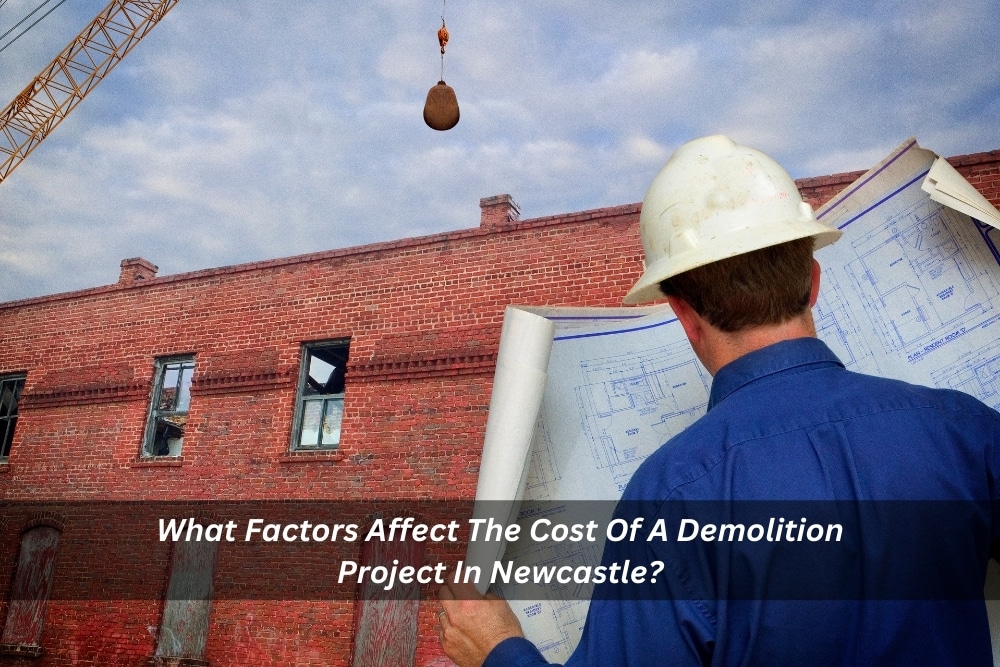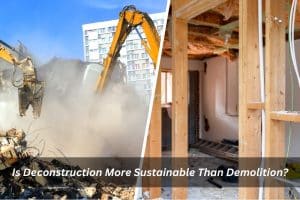Dreaming of a fresh start on a cleared plot of land? Before the wrecking ball swings, understanding what affects the cost of demolition in Newcastle is crucial. From charming cottages to towering apartment blocks, several factors influence the final bill, ensuring your demolition project stays within budget.
Unveiling the mystery: What exactly are you demolishing?
The first step is understanding the project’s scope. Consider:
- Size matters: A sprawling mansion naturally incurs higher demolition costs compared to a cozy bungalow. Square footage directly impacts labour, equipment, and debris removal needs.
- Material mayhem: Brick, concrete, and wood require different demolition techniques, impacting costs. Timber is generally easier to dismantle than reinforced concrete.
- Hidden hazards: Asbestos, lead, or other hazardous materials necessitate specialised handling and disposal, significantly inflating the demolition cost.
Does demolition get pricier in certain areas?
The address of your demolition project can significantly impact your final bill. Here’s why location matters:
Urban jungle vs. rural retreat
- Cityscape permits & regulations: Cityscapes often demand a plethora of permits, each with its own associated fee. Generally, navigating these permits can be complex, requiring additional expertise that might inflate your costs. Additionally, stricter city regulations regarding noise control, dust mitigation, and traffic management can necessitate specialised equipment and procedures, adding to the expense.
- Access challenges: Tightly packed city streets can pose access challenges for demolition crews and equipment. Moreover, hauling in machinery and navigating narrow alleys might require permits for road closures or specialised transportation, leading to increased costs.
Debris Disposal Dilemma
- Local disposal fees: Demolition generates a lot of rubble, and disposal fees vary depending on your location. Urban areas often have higher disposal costs due to limited landfill space and stricter environmental regulations. Researching local disposal fees and exploring recycling opportunities for materials like concrete or steel can significantly reduce your costs.
- Transportation logistics: Depending on the distance to disposal facilities, transporting debris can add up quickly. In rural areas with fewer disposal options, hauling costs might be higher compared to locations with nearby facilities.
Beyond the City Limits
- Research local regulations: Familiarise yourself with local demolition permits, access restrictions, and disposal fees before starting your project.
- Compare disposal options: Explore recycling opportunities and negotiate with disposal facilities for competitive rates.
- Factor in accessibility: Consider the ease of access to your site and potential transportation costs for equipment and debris removal.
By understanding these location-based factors, you can make informed decisions and minimise the impact of geography on your demolition project’s budget.
Beyond the rubble: Hidden factors that inflate the cost of demolition
Don’t underestimate these sneaky cost boosters:
- Buried treasures (or troubles): Unexpected utilities like buried pipes or electrical lines often require careful handling, which can delay the project and add to the expense. Discover more about common causes of delays and overruns in our blog post, What Causes Delays And Overruns In Demolition Projects?
- Environmental entanglements: Soil testing and potential remediation for contaminants like asbestos can significantly impact the cost of demolition.
- Labour logistics: Crew size and expertise directly affect the project’s duration and cost. Also, consider the experience and qualifications offered by different demolition contractors.
Planning makes perfect: How to minimise the cost of demolition
Demolition might seem like a straightforward process, but meticulous planning can save you significant money and headaches down the line. Here’s how to be a demolition planning pro:
Permit prowess: Don’t get caught in the red tape trap
Permits are often the unsung heroes of a smooth demolition project. Obtain all necessary permits well in advance, ideally months before the demolition date. This avoids costly delays and potential fines if you miss deadlines or encounter unexpected permit hurdles. Research your local regulations thoroughly, understanding the specific permits required for your project’s size, location, and scope. Don’t hesitate to consult with your chosen demolition contractor or a permit expeditor to ensure you have everything covered. Remember, a little upfront planning can prevent a major budget setback later.
Bidding bonanza: Unveiling the best value among demolition contractors
- Experience and qualifications: Choose a contractor with a proven track record of successful demolition projects, especially those involving similar structures or materials as yours.
- Insurance and licensing: Ensure the contractor has adequate insurance coverage and all necessary licences to operate in your area.
- Detailed scope of work: Get a clear and detailed breakdown of the services included in each quote, ensuring you’re comparing apples to apples. Additionally, don’t be afraid to ask clarifying questions and request specific inclusions or exclusions.
- References and reviews: Check the contractor’s references and online reviews to get a sense of their customer satisfaction and quality of work.
Recycle and repurpose: Turning demolition debris into cash
- Salvaging bricks and timber: Partner with local salvage yards or architectural salvage companies who might be interested in buying reclaimed bricks or timber for reuse in construction projects.
- Metal recycling: Contact local metal recycling facilities to inquire about their rates for various types of scrap metal you might recover during demolition.
- Creative reuse: Get creative! Consider using salvaged materials for landscaping projects, DIY furniture, or even artistic installations, minimising waste and adding a unique touch to your new space.
The bottom line: Demolishing wisely – keeping costs under control
Remember:
- Expect the unexpected: Factor in a buffer for unforeseen circumstances to avoid budget surprises.
- Transparency is key: Clear communication with your chosen demolition contractor ensures everyone is on the same page regarding costs and expectations.
- Informed decisions lead to success: By understanding the factors influencing the cost of demolition in Newcastle, you can make informed choices and ensure your project stays on track and within budget.
Ready to transform your vision into reality? Contact Watson Demolition & Site Services, Newcastle’s demolition experts. Furthermore, we offer transparent consultations, competitive pricing, and a commitment to delivering exceptional service. Let us help you navigate the demolition process with confidence and achieve your project goals effortlessly.



